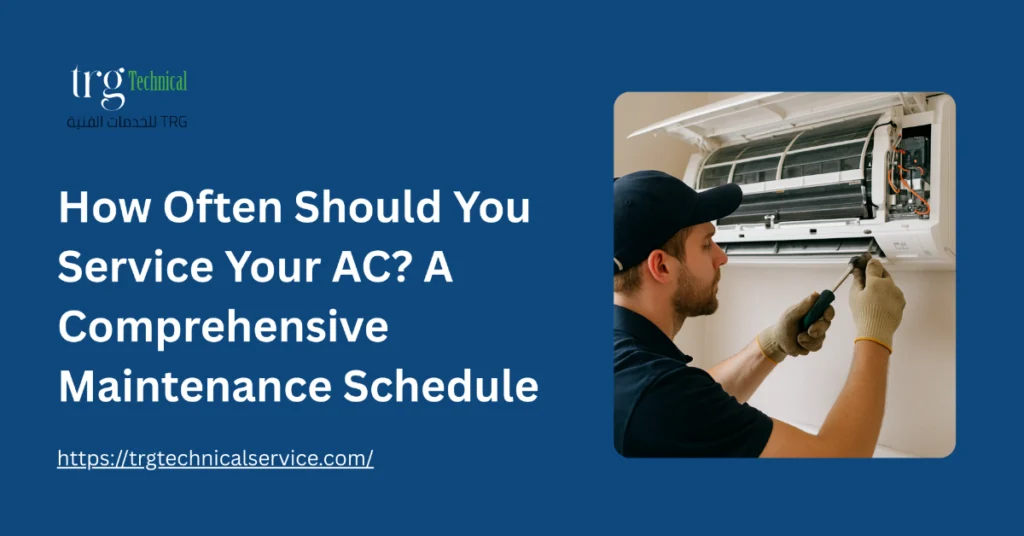How Often Should You Service Your AC? A Comprehensive Maintenance Schedule

How Often Should You Service Your AC?
Air conditioners are no longer a luxury they’re a necessity. Whether in a commercial building, residential home, or industrial workspace, a well-functioning air conditioning (AC) system is critical for comfort, productivity, and even safety. However, many people make the costly mistake of neglecting regular AC maintenance, only calling for service when something goes wrong.
This article walks you through exactly how often you should service your AC and provides a detailed, comprehensive schedule to keep your system running efficiently, year after year.
Why AC Maintenance Is So Important
Air conditioners operate on complex systems that rely on the coordination of components like filters, coils, compressors, fans, and refrigerant lines. Without regular servicing, dirt, debris, and wear-and-tear can reduce efficiency, spike your electricity bills, and shorten the lifespan of the entire unit.
Well-maintained systems:
Perform more efficiently
Maintain better air quality
Require fewer emergency repairs
Last longer (by several years in most cases)
Save money on both energy bills and replacement costs
Neglect, on the other hand, can turn into a very expensive gamble.
How Often Should You Service Your AC?
Here’s a breakdown of typical service frequency:
1. Residential AC Units
Basic Maintenance: Every 6 months (before summer and before winter)
Filter Cleaning/Replacement: Every 1 to 3 months
Professional Inspection: Once annually
If you live in a hot climate or run your AC daily for most of the year, a bi-annual service is highly recommended one before the peak summer season and one after, to check for wear and refrigerant issues.
Read also: How Seasonal HVAC Maintenance Prevents Breakdowns in Extreme Weather
2. Commercial AC Systems
Basic Maintenance: Quarterly
Filter Cleaning/Replacement: Monthly or bi-monthly
Duct Cleaning & Coil Inspection: Twice a year
Compressor & Electrical Components Check: At least twice a year
Due to higher usage, commercial systems need more frequent care. Failure in such settings can not only cause discomfort but lead to losses in productivity and even health risks from poor air circulation.
Read also: How to Spot Signs Your AC Needs a Professional Tune-Up
3. Industrial HVAC Systems
Comprehensive Service: Every 3 months
Filter & Vent Maintenance: Monthly
Sensor and Control Calibration: Twice a year
Vibration & Noise Testing: Quarterly
Energy Efficiency Assessment: Annually
Given the scale and importance of temperature control in industrial operations especially in manufacturing, pharmaceuticals, and food industries preventive maintenance is not optional.
Read also: How to Extend the Life of Your HVAC System with Proper Care
The Ideal AC Maintenance Schedule: Month-by-Month
To make this easy to follow, here’s a month-wise breakdown suitable for both home and business owners:
January: Filter Replacement
Even if your AC isn’t used much in winter, replacing filters improves air quality and prevents system strain.
March: Pre-Summer Inspection
Hire a professional technician to check refrigerant levels, duct integrity, thermostat function, and electrical systems before the summer rush.
May: Deep Coil Cleaning
Dirty coils reduce heat transfer efficiency. Cleaning them before peak heat ensures maximum performance.
July: Mid-Summer Check
By this time, your system has been running for months. Have a technician inspect the blower, drain lines, and system pressure.
September: Post-Summer Tune-Up
Ideal time to inspect components for wear and check for energy efficiency issues caused by the heavy usage in hot months.
November: Pre-Winter Service
Even if you’re switching to heating mode, your HVAC system as a whole benefits from filter changes, duct checks, and thermostat calibration.
Read also: Top 10 Most Common HVAC Issues and How to Avoid Them
Signs That Your AC Needs Immediate Servicing
Sometimes, waiting for your next scheduled service isn’t enough. Watch out for these warning signs:
Warm air blowing despite a cold setting
Weak airflow or uneven cooling
Frequent cycling on and off
Strange noises like grinding or squealing
Bad odors when the unit runs
Water leaks or pooled moisture around the system
Higher than usual electricity bills
If any of these symptoms appear, schedule a professional inspection immediately to prevent long-term damage.
Read also: The Cost of Neglecting HVAC Maintenance: What Can Go Wrong
What Does a Professional AC Service Include?
Many people don’t realize what goes into a full-service check. A reputable technician should carry out the following:
Clean or replace filters
Check and top up refrigerant levels
Inspect and clean condenser and evaporator coils
Lubricate moving parts
Test the thermostat for accuracy
Inspect all electrical connections
Check the condensate drain for clogs
Evaluate overall system performance
Some HVAC providers also offer annual maintenance plans, which bundle these services at a discounted rate and provide automatic reminders for scheduled checkups.
Read also: Why Regular HVAC Maintenance Is Key to Saving on Energy Bills
DIY Maintenance vs Professional Service
You can and should do some tasks yourself:
Replace air filters regularly
Clean dust and debris from vents
Ensure outdoor units are free from leaves, dirt, and blockages
However, internal components, refrigerant handling, and electrical diagnostics should be left to licensed professionals. DIY mistakes can void warranties or even pose serious safety risks.
The Cost of Not Maintaining Your AC
Skipping regular service can lead to:
Up to 20% higher energy bills
Early compressor failure (one of the most expensive parts)
Poor indoor air quality (mold, allergens, bacteria)
Costly emergency breakdowns during peak seasons
Shortened system lifespan (by 5 years or more)
In short, the small upfront cost of routine maintenance is a smart investment compared to the large bills you’ll face from major failures or early replacements.
Final Thoughts
Regular AC maintenance isn’t just about keeping cool it’s about protecting your investment, ensuring energy efficiency, and maintaining indoor air quality. Whether you’re a homeowner or facility manager, following a set service schedule saves time, money, and stress in the long run.
For expert, reliable, and affordable HVAC maintenance services in the UAE, trust the professionals at TRG Technical Services.


